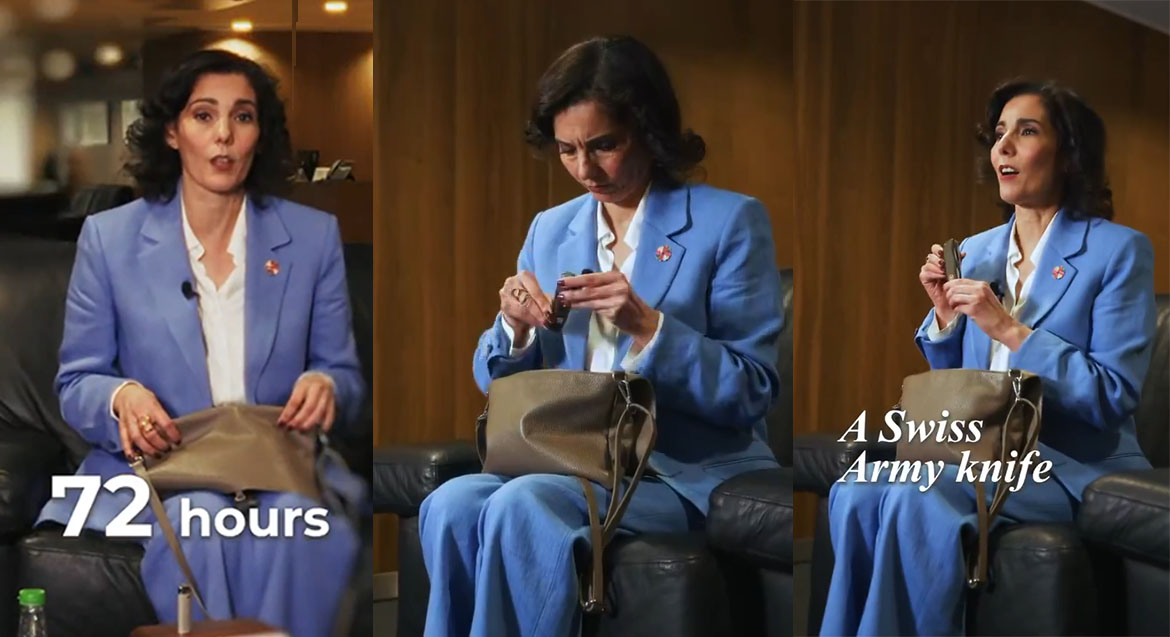Tensions between the European Union and Russia have reached a boiling point. EU Commissioner for Preparedness and Crisis Management, Hadja Lahbib, has proposed a 72-hour survival kit to use if Russia attacks Europe.
Recent statements from officials and emerging policy shifts suggest that Brussels may be shifting from diplomacy to a more confrontational stance, raising fears of an escalating crisis in Eastern Europe.
The European Union has advised its 450 million inhabitants to stockpile sufficient supplies for at least 72 hours, citing increasing risks of war, cyberattacks, climate change, and disease.
On Wednesday, EU Commissioner for Crisis Management Hadja Lahbib stated that the warning reflects a broader strategy to improve civil readiness across the bloc.
Hungarian Foreign Minister Péter Szijjártó ignited a firestorm when he criticized the European Commission directive urging EU citizens to prepare with 72-hour survival kits, complete with snack bars, a bottle of water, and a Swiss Army Knife, all in a neat lady’s handbag.
In a video address posted on March 28, Szijjártó remarked, ”We first thought it was some kind of trolling or a joke,” before asserting that the only plausible explanation is that ”Brussels is preparing for war” with Russia.
Today, the EU launches its new #Preparedness Strategy.
“Ready for anything” — this must be our new European way of life. Our motto and #hashtag. pic.twitter.com/fA1z8ZvMDA
— Hadja Lahbib (@hadjalahbib) March 26, 2025
However, Lahbib has not proposed the 75-hour survival kit as a joke. Rather, she has advocated for the handy survival kit as part of a serious EU initiative to enhance crisis preparedness across the bloc.
This proposal is embedded in the European Commission’s Preparedness Union Strategy, unveiled in March 2025.
Szijjártó demanded clarity from the Commission, questioning, ”Why, in the 21st century, should EU citizens prepare a survival kit?”. His comments reflect Hungary’s long-standing skepticism of EU policies.
On March 25, a senior NATO official, speaking anonymously, revealed that several member states are quietly increasing troop readiness along the bloc’s eastern borders, citing ”credible threats” from Russian military maneuvers near Ukraine and the Baltic states.
This follows reports of Russia conducting large-scale drills involving nuclear-capable units, a move Moscow claims is a response to Western provocations.
In Brussels, EU foreign policy chief Josep Borrell has not explicitly confirmed war preparations but emphasized the need for ”resilience” in a March 27 press conference.
”We must be ready for any scenario,” Borrell said. He added that the Commission’s survival kit recommendation is part of a broader civil defense strategy—an explanation critics like Szijjártó dismiss as a thinly veiled pretext.
Across the continent, reactions vary sharply. Polish Prime Minister Mateusz Nowak, whose country shares a border with Russia’s Kaliningrad exclave, endorsed the EU’s moves on March 28, stating, ”We cannot ignore the bear at our doorstep. Preparedness is not provocation—it’s survival.”
In contrast, German Chancellor Anna Berger urged caution in a Bundestag speech yesterday, warning that ”escalation benefits no one” and calling for renewed diplomatic efforts.
Analysts see the EU’s actions as a response to a deteriorating security landscape. Dr. Elena Petrova, a security expert at the University of Warsaw, noted, ”The survival kit directive, combined with NATO’s troop movements, suggests a shift from deterrence to active contingency planning. Russia’s behavior has left little room for optimism.”
As reflected in posts on X, public sentiment mirrors the divide among leaders. Some users applaud the EU’s resolve, with one writing, ”Finally, Brussels wakes up to the Russian threat.” Others echo Szijjártó’s alarm, with a post reading, ”72-hour kits? This isn’t a drill—it’s war prep, and it’s terrifying.”
Questions loom over the EU’s unity and strategy. Hungary’s dissent, underscored by Szijjártó’s blunt critique, highlights the bloc’s internal fractures. The coming weeks could determine whether Europe’s preparations avert conflict or hasten its arrival.
The question on every sane person’s mind is: When will EU parliamentarians start to dance for war, in formations?
By T. Sassersson, NewsVoice
Related and sources
- Politico: Western troops in Ukraine risk ‘world war,’ Hungary’s top diplomat says
- NewsVoice: Hungary’s Foreign Minister Peter Szijjarto Firm on Peaceful Resolution in Ukraine Conflict Amidst Western Pressure
- TASS: Hungary wants explanation from Brussels about preparations for war with Russia — Szijjarto
- RT: EU ‘preparing for war’ – member state (March 29), EU tells citizens to stockpile food (March 26 march)


